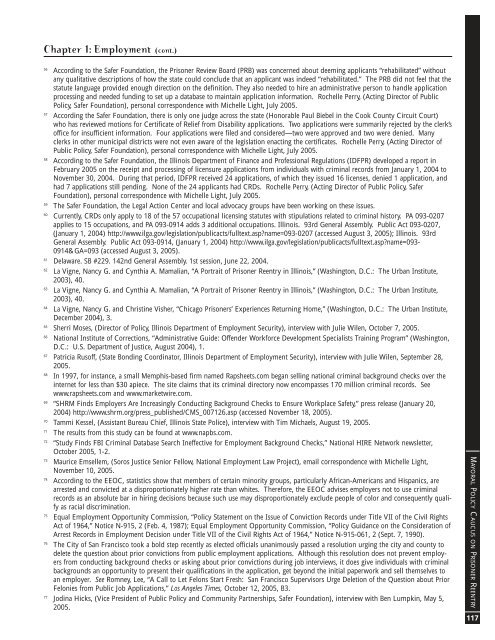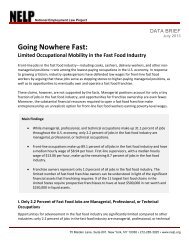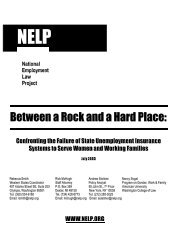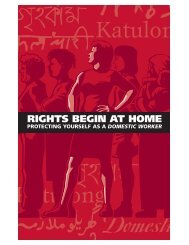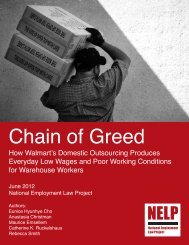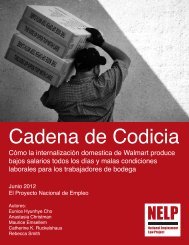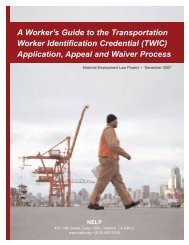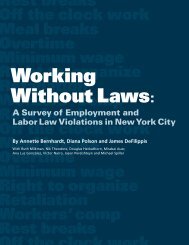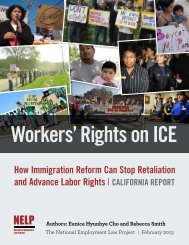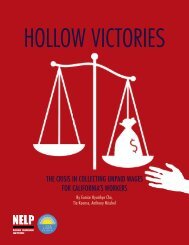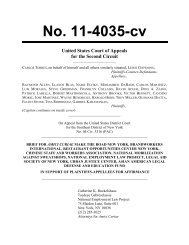Rebuilding Lives. Strengthening Communities.
Rebuilding Lives. Strengthening Communities.
Rebuilding Lives. Strengthening Communities.
Create successful ePaper yourself
Turn your PDF publications into a flip-book with our unique Google optimized e-Paper software.
Chapter 1: Employment (cont.)<br />
56<br />
According to the Safer Foundation, the Prisoner Review Board (PRB) was concerned about deeming applicants “rehabilitated” without<br />
any qualitative descriptions of how the state could conclude that an applicant was indeed “rehabilitated.” The PRB did not feel that the<br />
statute language provided enough direction on the definition. They also needed to hire an administrative person to handle application<br />
processing and needed funding to set up a database to maintain application information. Rochelle Perry, (Acting Director of Public<br />
Policy, Safer Foundation), personal correspondence with Michelle Light, July 2005.<br />
57<br />
According the Safer Foundation, there is only one judge across the state (Honorable Paul Biebel in the Cook County Circuit Court)<br />
who has reviewed motions for Certificate of Relief from Disability applications. Two applications were summarily rejected by the clerk’s<br />
office for insufficient information. Four applications were filed and considered—two were approved and two were denied. Many<br />
clerks in other municipal districts were not even aware of the legislation enacting the certificates. Rochelle Perry, (Acting Director of<br />
Public Policy, Safer Foundation), personal correspondence with Michelle Light, July 2005.<br />
58<br />
According to the Safer Foundation, the Illinois Department of Finance and Professional Regulations (IDFPR) developed a report in<br />
February 2005 on the receipt and processing of licensure applications from individuals with criminal records from January 1, 2004 to<br />
November 30, 2004. During that period, IDFPR received 24 applications, of which they issued 16 licenses, denied 1 application, and<br />
had 7 applications still pending. None of the 24 applicants had CRDs. Rochelle Perry, (Acting Director of Public Policy, Safer<br />
Foundation), personal correspondence with Michelle Light, July 2005.<br />
59<br />
The Safer Foundation, the Legal Action Center and local advocacy groups have been working on these issues.<br />
60<br />
Currently, CRDs only apply to 18 of the 57 occupational licensing statutes with stipulations related to criminal history. PA 093-0207<br />
applies to 15 occupations, and PA 093-0914 adds 3 additional occupations. Illinois. 93rd General Assembly. Public Act 093-0207,<br />
(January 1, 2004) http://www.ilga.gov/legislation/publicacts/fulltext.aspname=093-0207 (accessed August 3, 2005); Illinois. 93rd<br />
General Assembly. Public Act 093-0914, (January 1, 2004) http://www.ilga.gov/legislation/publicacts/fulltext.aspname=093-<br />
0914&GA=093 (accessed August 3, 2005).<br />
61<br />
Delaware. SB #229. 142nd General Assembly. 1st session, June 22, 2004.<br />
62<br />
La Vigne, Nancy G. and Cynthia A. Mamalian, “A Portrait of Prisoner Reentry in Illinois,” (Washington, D.C.: The Urban Institute,<br />
2003), 40.<br />
63<br />
La Vigne, Nancy G. and Cynthia A. Mamalian, “A Portrait of Prisoner Reentry in Illinois,” (Washington, D.C.: The Urban Institute,<br />
2003), 40.<br />
64<br />
La Vigne, Nancy G. and Christine Visher, “Chicago Prisoners’ Experiences Returning Home,” (Washington, D.C.: The Urban Institute,<br />
December 2004), 3.<br />
65<br />
Sherri Moses, (Director of Policy, Illinois Department of Employment Security), interview with Julie Wilen, October 7, 2005.<br />
66<br />
National Institute of Corrections, “Administrative Guide: Offender Workforce Development Specialists Training Program” (Washington,<br />
D.C.: U.S. Department of Justice, August 2004), 1.<br />
67<br />
Patricia Rusoff, (State Bonding Coordinator, Illinois Department of Employment Security), interview with Julie Wilen, September 28,<br />
2005.<br />
68<br />
In 1997, for instance, a small Memphis-based firm named Rapsheets.com began selling national criminal background checks over the<br />
internet for less than $30 apiece. The site claims that its criminal directory now encompasses 170 million criminal records. See<br />
www.rapsheets.com and www.marketwire.com.<br />
69<br />
“SHRM Finds Employers Are Increasingly Conducting Background Checks to Ensure Workplace Safety,” press release (January 20,<br />
2004) http://www.shrm.org/press_published/CMS_007126.asp (accessed November 18, 2005).<br />
70<br />
Tammi Kessel, (Assistant Bureau Chief, Illinois State Police), interview with Tim Michaels, August 19, 2005.<br />
71<br />
The results from this study can be found at www.napbs.com.<br />
72<br />
“Study Finds FBI Criminal Database Search Ineffective for Employment Background Checks,” National HIRE Network newsletter,<br />
October 2005, 1-2.<br />
73<br />
Maurice Emsellem, (Soros Justice Senior Fellow, National Employment Law Project), email correspondence with Michelle Light,<br />
November 10, 2005.<br />
74<br />
According to the EEOC, statistics show that members of certain minority groups, particularly African-Americans and Hispanics, are<br />
arrested and convicted at a disproportionately higher rate than whites. Therefore, the EEOC advises employers not to use criminal<br />
records as an absolute bar in hiring decisions because such use may disproportionately exclude people of color and consequently qualify<br />
as racial discrimination.<br />
75<br />
Equal Employment Opportunity Commission, “Policy Statement on the Issue of Conviction Records under Title VII of the Civil Rights<br />
Act of 1964,” Notice N-915, 2 (Feb. 4, 1987); Equal Employment Opportunity Commission, “Policy Guidance on the Consideration of<br />
Arrest Records in Employment Decision under Title VII of the Civil Rights Act of 1964,” Notice N-915-061, 2 (Sept. 7, 1990).<br />
76<br />
The City of San Francisco took a bold step recently as elected officials unanimously passed a resolution urging the city and county to<br />
delete the question about prior convictions from public employment applications. Although this resolution does not prevent employers<br />
from conducting background checks or asking about prior convictions during job interviews, it does give individuals with criminal<br />
backgrounds an opportunity to present their qualifications in the application, get beyond the initial paperwork and sell themselves to<br />
an employer. See Romney, Lee, “A Call to Let Felons Start Fresh: San Francisco Supervisors Urge Deletion of the Question about Prior<br />
Felonies from Public Job Applications,” Los Angeles Times, October 12, 2005, B3.<br />
77<br />
Jodina Hicks, (Vice President of Public Policy and Community Partnerships, Safer Foundation), interview with Ben Lumpkin, May 5,<br />
2005.<br />
MAYORAL POLICY CAUCUS ON PRISONER REENTRY<br />
117


